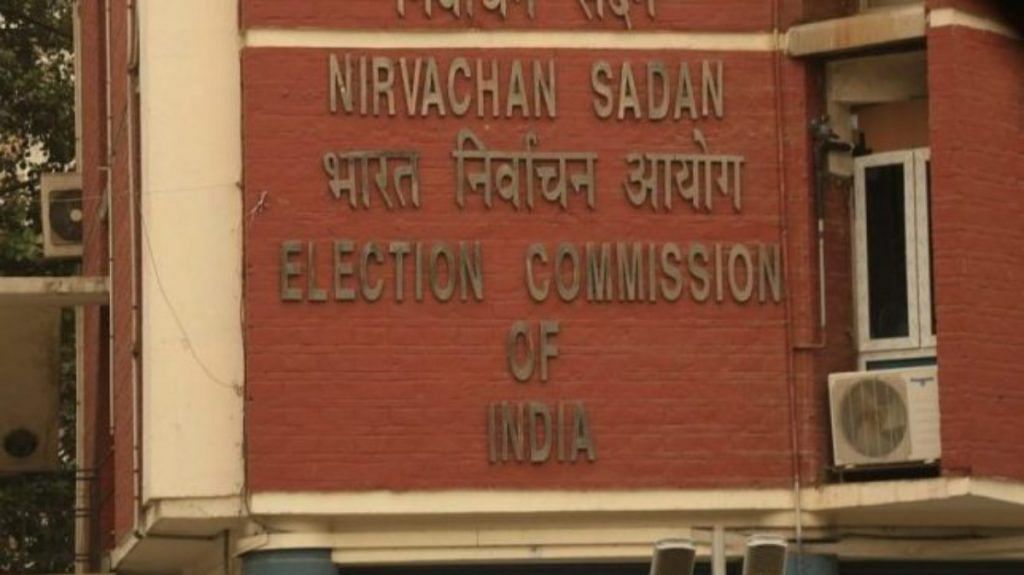New Delhi: The Election Commission of India’s (ECI) proposed policy to make political parties furnish details of financial implications of their poll promises would require them to assess total expenditure on each promise before elections.
According to the proposed proforma prepared by the ECI, available for download on its website, the policy would require political parties to declare thorough details on how they plan to increase revenue receipts, rationalise expenditures, and go for borrowings in case financial conditions of the concerned states or the central government seem to be inadequate for funding those poll promises.
It also requires states and Union territories (in case of assembly elections) and the Union government (in case of general elections) to provide details of revenue receipts, expenditure, and net borrowings, among some other financial details to the ECI within a deadline after election dates are announced.
In a letter to political parties dated 4 October, the ECI had sought a response from all recognised parties on this proposal and asked them to convey their views to the commission by 19 October.
The move comes close on the heels of a raging debate over “freebies” triggered by Prime Minister Narendra Modi’s “revdi culture” (freebie culture) remark, made at a public meeting on 16 July earlier this year, and a petition before a three-judge bench of the Supreme Court challenging promises of “irrational freebies” by political parties.
Modi’s remark had drawn sharp criticism from opposition parties who alleged that several schemes of the Bharatiya Janata Party (BJP) could be classified under this category.
Delhi Chief Minister Arvind Kejriwal, national convenor of the Aam Aadmi Party (AAP) — looking to give BJP a tough fight in the poll-bound states of Gujarat and Himachal Pradesh — seems to have adopted a particularly aggressive strategy by countering the PM’s remarks through the prism of freebies vs welfare.
Speaking to ThePrint about the EC’s proposed policy, N. Gopalaswami and S.Y. Quraishi, former chief election commissioners (CEC), expressed different views.
While Gopalaswami said it might make political parties “more responsible” and “educate voters”, Quraishi believes that the EC should not question the manifestos and that if a party’s promises are “absurd or unrealistic”, their political opponents or the media should be the one to expose them.
Also read: No law on poll hate speech so acting under IPC & Representation of People Act, EC tells apex court
The EC’s action plan
The proposed proforma is broadly divided into three sections. ThePrint breaks down what it says.
Under the first section, political parties are supposed to elaborate on each of their poll promises. They must explain its coverage in terms of whether it is meant for individuals, families, or households, what is the targeted population, and the estimated number of beneficiaries to be covered.
Then they are expected to furnish details on estimated expenditure per beneficiary and the total expenditure likely to carry out the concerned promise.
The second section directs the political parties to share details of a financial action plan, highlighting how they intend to finance the total expenditure required to fulfill their promises — especially if the state has a deficit budget.
In such a case, they have to give a plan on how they intend to increase revenue receipts — for example, if they plan to increase existing taxes, bring new taxes, or go for harder budget measures such as disinvestment and monetisation of assets.
They should provide details on whether they plan to rationalise current expenditures, if they plan to go for additional borrowings, and how their proposed action plan would impact the state’s fiscal sustainability rations such as debt-to-GDP.
In the third section, central government and concerned states are supposed to provide details of revenue receipts, expenditure, net borrowings, outstanding liabilities, break-up of gross state domestic product in nominal terms and fiscal sustainability ratios.
‘EC should not question manifestos’
Former CEC Gopalaswami told ThePrint, “I would look at [the ECI’s policy] through two broad lenses… First, it is an attempt to make political parties more responsible when they make poll promises and more accountable towards voters. Second, it is an attempt to contribute towards educating the voters and helping them assess promises made by political parties. As far as the possibilities of effective and efficient implementation of such a policy by the ECI is concerned, I think it is a bit early to comment.”
Quraishi, though, said implementation and implications of poll promises made by political parties should at best be left to the Parliament and state assemblies. “The Election commission was asked by the Supreme Court to frame guidelines that could govern the contents of the election manifesto. The Election Commission’s recent letter to political parties is a step towards that. In my opinion, promises by political parties, their implementation and implications should be debated in the Parliament and assemblies.”
“I think the Commission should not question the manifestos. If the promises of a political party are absurd or unrealistic, it is for their political opponents and the media to expose them. And voters do remember promises. They are always capable of rewarding good performance and punishing non-delivery,” he added.
(Edited by Zinnia Ray Chaudhuri)
Also read: Ghost addresses, empty offices — the shadowy world of registered unrecognised political parties
